Are you a new member? Sign up now
Login area
| Sign up
Publications
This report presents results, main findings and recommendations from the assessment conducted in August-September 2013 for the Mental Health and Psychosocial Support (MHPSS) services provided for Syrian refugees in Lebanon commissioned by UNHCR. The objectives of this assessment were:
-Reviewing existing data on MHPSS provided for Syrian refugees in Lebanon.
-Mapping the NGOs providing MHPSS services in Beirut, Bekaa, South and North Lebanon (4Ws).
-Assessing the conformity of programmes and services to international guidelines such as IASC guidelines, Psychological First Aid and the WHO mental health Gap Action Programme intervention guide (mhGAP-IG), taking into consideration the accessibility, the acceptability, the affordability and the quality of care.
-Assessing the coordination between different actors.
-Analysing existing models, highlighting the gaps, reflecting on the particular context of Syrian refugees in Lebanon and provide practical recommendations to UNCHR.
Assessment of mental health and psychosocial support services for Syrian refugees in Lebanon
To read the article, click on the following link: Link This article, published in the Humanitarian exchange, shares Lebanon’s experience and lessons learned in mental health and psychosocial support (MHPSS) response coordination following the Syrian crisis. Lessons learned and key considerations for MHPSS coordination are put forth.
To read the article, click on the following link: Link
These two letters to the Editor, published in the Lancet Journal, provide an overview of the situation in Lebanon amidst the Syrian crisis and the resilience of the health system against all odds. They particularly shed light on the establishment of a national mental health programme and the launching of a mental health system reform in Lebanon, as an example of turning adversity into positive change. The factors that have led to this growth are highlighted. The authors nevertheless warn about the importance of bearing in mind the major impact that social determinants have on mental health and stress that effective action for mental health will be hindered unless these determinants, such as ongoing conflict, displacement and socio-political injustices, are addressed.
1.Syrian crisis and mental health system reform in Lebanon-Correspondence- Vol384- Lancet Journal-August2014
2.Mental health reform in Lebanon and the Syrian crisis. Correspondence- Vol3- Lancet Journal-March2016 This article indicates that evidence on substance use in Lebanon shows an increase in usage, limited availability and accessibility to evidence-based services, and high level of stigma and discrimination. In line with the “Mental Health and Substance Use Strategy for Lebanon 2015–2020”, the Ministry of Public Health initiated the process of developing a strategy focused on substance use response to address these challenges in collaboration with the Ministries of Education and Higher Education, Interior and Municipalities, Justice and Social Affairs. The result of this process was a strategy launched jointly by the ministries including six domains of action covering the whole spectrum of substance use response with strategic objectives addressing the identified challenges.
Download Developing an inter-ministerial substance use response strategy for Lebanon: process, content and lessons learned This article, published in the British Journal of Psychiatry, provides an overview of the mental health situation in Lebanon amidst the Syrian crisis. Research involving refugees conducted in Lebanon since the onset of the Syrian crisis points to a clear increase in mental disorders in the young and adult Syrian refugee population in association with that crisis. At the policy level, despite the great strain on its health system, Lebanon has undertaken a reform of the mental health system through the implementation of a 5-year national mental health strategy which aims at improving the opportunities for better mental health and wellbeing for all persons living in Lebanon, regardless of nationality.
Download Lebanon: mental health system reform and the Syrian crisis
Decreasing suicide is a target of the 2030 sustainable development agenda and the global mental health action plan. If not addressed, suicide has huge impact on individuals, families, societies, and humanity as a whole.
To read the brief: English / Arabic
Policy brief highlighting main policy recommendations related to the mental health system reform in Lebanon.
- To assess the level of the implementation of the strategy and the progress towards the achievement of the expected results
- To asses the efficiency and effectiveness of the implementation through examining conducive factors as well as challenges that need to be addressed.
- To provide recommendations for the effective and efficient implementation and monitoring of the remaining part of the strategy towards mental health reform.
Executive summary of the external mid-term evaluation report of the Lebanon National Mental Health Strategy
To read the full report, click on the link below:
Report of the external mid-term evaluation of the Lebanon National Mental Health Strategy
The World Health Organization Assessment Instrument for Mental Health Systems (WHO-AIMS) was used to collect information on the mental health system in Lebanon.
This included assessment of the policy and legislative framework; mental health services; mental health in primary health care; human resources; public education and links with other sectors; and monitoring and research.
The goal of collecting this information is to enable policy makers to develop information-based mental health plans with clear base-line information and targets.
This assessment took place between February 2015 and July 2015, and data retrieved is based on the year 2014 and collected from facility, district/regional, and national levels.
This included assessment of the policy and legislative framework; mental health services; mental health in primary health care; human resources; public education and links with other sectors; and monitoring and research.
The goal of collecting this information is to enable policy makers to develop information-based mental health plans with clear base-line information and targets.
This assessment took place between February 2015 and July 2015, and data retrieved is based on the year 2014 and collected from facility, district/regional, and national levels.
Mapping of services for response to substance use disorders - 2017 Map of organizations providing substance use and rehabilitation services in Lebanon
Substance use and rehabilitation services map- Lebanon
Report of the mapping exercise conducted by the National Mental Health Programme for the year 2014 using the WHO “4Ws” mapping tool, which is an essential component for locating, assessing, coordinating and planning MHPSS services.
The report compares the 2014 results to those of the previous and first mapping exercise of the 4Ws in Lebanon published in the December 2013 UNHCR commissioned report, "Assessment of Mental Health and Psychosocial Support Services for Syrian Refugees in Lebanon" to display the changes in service delivery.
The report concludes with a set of recommendations in relation to five main domains: training, service provision, research, coordination and the future “4Ws” mappings.
Mapping of services for response to substance use disorders - 2017 Map of organizations providing substance use and rehabilitation services in Lebanon
Substance use and rehabilitation services map- Lebanon
Report of the mapping exercise conducted by the National Mental Health Programme for the year 2014 using the WHO “4Ws” mapping tool, which is an essential component for locating, assessing, coordinating and planning MHPSS services.
The report compares the 2014 results to those of the previous and first mapping exercise of the 4Ws in Lebanon published in the December 2013 UNHCR commissioned report, "Assessment of Mental Health and Psychosocial Support Services for Syrian Refugees in Lebanon" to display the changes in service delivery.
The report concludes with a set of recommendations in relation to five main domains: training, service provision, research, coordination and the future “4Ws” mappings.
The National Observatry on Drugs and Drug Addiction (NODDA) was launched by the Ministry of Public Health in 2016 in line with the implementation of a strategic objective of the “Inter-ministerial Substance Use Response Strategy for Lebanon 2016-2021”.
The NODDA plays a key role in collecting, analyzing and generating evidence from national databases that can inform policy and service development.
Read more on: http://www.moph.gov.lb/en/Pages/3/4771/narcotics-#/en/view/10643/national-observatory-on-drugs-and-drug-addiction
To view the report, please click on the following link:
NODDA report- 2017
Sitemap 

© Copyrights reserved to Ministry of Public Health 2026






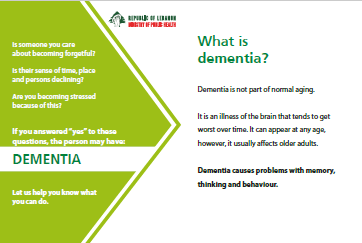
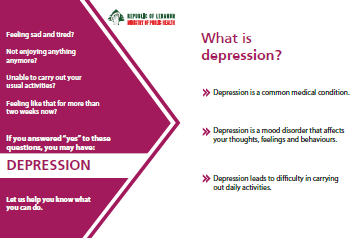
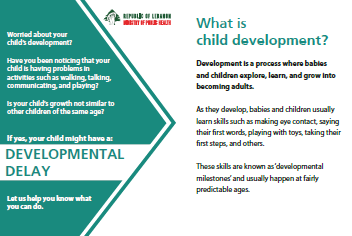
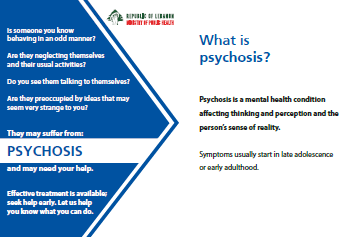
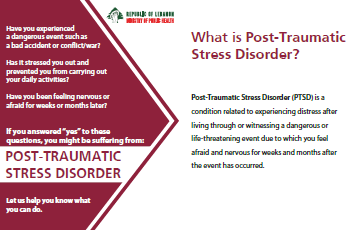
 Download Policy Brief NMHP InnovFair FINAL1.4.16.pdf
Download Policy Brief NMHP InnovFair FINAL1.4.16.pdf